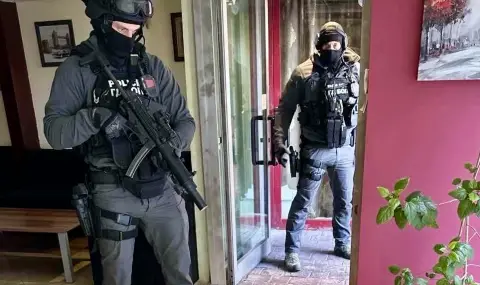Comment by Emilia Milcheva:
If the state raised salaries based on merit, employees in the Ministry of Interior would be left in line, especially given the sharp decline in the feeling of security among citizens. From 52.4% in 2022, it decreased to 45.1% in 2024, as measured by the "Society and Security" foundation. But political reality dictates otherwise - taxpayers' money is being distributed at a pace reminiscent of the time when bundles flew out of the jeep.
What is promised is not always delivered. Look at the nurses who have been left waiting for years - despite repeated assurances. But there is always money for the police and the military, even if this requires cutting other expenses. Thus, subject to momentary political calculations, the deputies of the previous 50th parliament unanimously decided to increase salaries in the Ministry of Interior by between 40% and 56% and in the Ministry of Defense (MOD) by 30% to 50% from January 1, 2025.
Over 1 billion for higher salaries in the Ministry of Interior
This measure will cost the budget a serious amount: 1.25 billion leva for the Ministry of Interior and another 520 million for the MOD. These new expenses were voted on months after the adoption of the current budget and without a clear commitment to long-term financial stability. The sensible solution would be for a regular government to determine its priorities and the corresponding budget for next year. But instead, the parliament, dominated by short-term interests, will prefer to "buy" public peace and electoral dividends, in the context of the increasingly clear eighth parliamentary elections in the spring.
What will happen if the 2025 budget is not adopted? By law, the state will spend in monthly portions of 1/12 of the current budget. However, this means failure to fulfill the promised increases not only for the "Security" sector, but also for education. In conditions of elections and political instability, no party would risk the discontent of thousands of budget employees and their families. But there is another consideration - the Ministry of Internal Affairs plays a significant role in the electoral process, guarding it, is obliged to ensure the prevention of electoral violations and investigate signals of violations. And GERB-SDF, DPS-New Beginning, President Radev, CITUB, etc. have already announced their support for higher salaries for the Ministry of Interior and the Ministry of Defense.
Doomed to populism
The unions in the Ministry of Interior are ready to protest if the planned salary increase does not become a reality in 2025. One of their main arguments is that otherwise they will remain "insultingly close" to the minimum wage, which is planned to be 1077 leva from January 1. In the army, the increase will raise the lowest salaries from 1,450 leva to 2,020 leva.
Who could blame the police for wanting what was guaranteed to them by law, promulgated in February in the State Gazette?
The people's representatives ignored many other obligations assumed by law, including the election of a political quota in the Supreme Judicial Council and an anti-corruption commission. Their implementation would have ensured a certain stability of the judicial system and higher public trust, but the parties never reached an understanding among themselves. However, there is complete unanimity regarding the salaries of the Ministry of Internal Affairs and the military.
If financial analysts in Bulgaria are united on one thing, it is the risk of a budget crisis due to the careless squandering of public funds. The administration is increasing instead of decreasing, and the quality of public services is increasingly lower. For the fourth year after the COVID-19 pandemic, restaurateurs and restaurant owners are still subject to 9% VAT. The policy of compensating business electricity bills at prices above 180 BGN/MWh also continues. Recently, at a forum of the Institute for Market Economics (IME), economist from "Open Society" Georgi Angelov stated that "the budget has been pierced like Swiss cheese by corporate interests that have found their way to power". According to Fiscal Council member Lyubomir Datsov, there is "unprincipled wage increases". The chief economist of the Institute of International Relations Lachezar Bogdanov believes that a debate is needed to set a framework and a reasonable limit to the ambitions for higher spending and political pressure.
And who is the Ministry of Interior actually protecting?
In the conditions of a permanent election campaign, however, the voice of reason is not just silenced, but drowned in populism. Reforms are pushed to the background, to wait… when their time comes. The participants in this feast do not realize that in the end they will pay the bill.
The Ministry of Interior does not inspire fear among crime bosses and drug dealers - too many uniformed officers have long since built comfortable "working" relations with them. But when the police threaten protests, politicians tremble. Their discontent attracts media attention and, under pressure from the uniformed officers, the parties compete to demonstrate "support" for statehood, even though it is mere political theater.
So far, there has been no case in which the protests of police officers have not won salary increases. But none of the deputies dares to ask the simple question: who does the Ministry of Interior actually protect and whose order does it guarantee?
